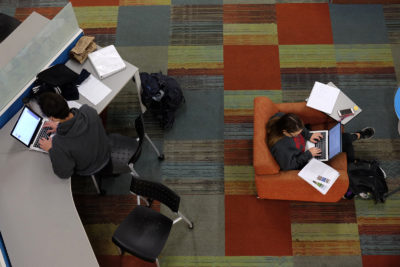
Despite rapid growth in undergraduate computer science program enrollment, the field is expanding faster than it can be filled, and many universities including Boston University are working to adapt their programs to these trends.
The 185-page report published Friday in The National Academies of Science, Engineering, and Medicine found there are currently more jobs available than there are students obtaining bachelor’s degrees in computer science.
The nationwide trend of growing computer science enrollment places additional pressure on universities and other educational institutions to provide ample resources for their computer science programs, according to an article in Inside Higher Ed.
Computer science professor Wayne Snyder explained that BU is no stranger to these trends, and the rapid expansion of computer science programs brings challenges. Snyder said this was evident on BU’s campus by the speed with which computer science courses filled on Sunday when juniors and seniors began enrolling in classes for the spring 2018 semester.
“I’m teaching a class [next semester], and it filled in two hours,” said Snyder, who is the director of undergraduate studies in the computer science department. “Our classes filled so fast on Sunday. It’s a challenge. Now we’re opening more seats. The enrollments are tough, and our physical space is pretty limiting.”
Snyder said the growth in demand for computer science courses did not come as a surprise to BU’s computer science department and that school administrators have been accommodating with the changes.
“We’ve been expecting this for a very long time,” Snyder said. “We have an administration that fully understands this and is eager to help us.”
Snyder also explained that the positive trend of student enrollment in computer science programs reflects a need for more computer science educators.
“It’s a very high-skill activity,” Snyder said. “You can’t just run out on the street and get people and hire them. You have to develop over a long period of time.”
Ran Canetti, another computer science professor, agreed that there has been substantial growth in BU’s computer science program and attributed that change in part to computer science’s increasingly widespread appeal.
“People are doing it because it’s a cool thing to do, there’s money in it, there’s a future,” Canetti said, “[Student] interests are on average much more applied, less mathematical or theoretical and more applied on how [computer science] can be put to use.”
Canetti said that BU’s computer science department has adapted by expanding and enriching its course offerings.
“The program is much, much larger,” he said. “There are many more computer science majors. There is a much wider variety of courses, much more applied courses and the courses are specific to topics that are relevant and hot today.”
Several BU computer science students said they have noticed the growth in demand for computer science careers.
Sarah Greisdorf, a freshman in the College of Arts and Sciences, said that the results of the report were not surprising due to the increasing prevalence of technology.
“I don’t find the trends from the report to be very surprising given the fact that technology is having an increasingly integral role in every aspect of society,” Greisdorf said. “Since this is the case, it makes sense that more people would see the value in studying computer science.”
Greisdorf also wrote that she thinks BU is doing a good job supporting students in the computer science field.
“With the development of the SPARK! lab and support of Hack the Gap, BostonHacks, and SheHacks, BU is clearly expanding the reach of the CS department and knows the value of computer science,” she said.
Timi Coker, a College of Communication senior who is pursuing a minor in computer science, said he thinks BU should increase student exposure to computer sciences.
“Introduce more concepts related to computer science in other fields of study so people are more introduced to it at an earlier point in their college career,” Coker said, “I would’ve majored in computer science had I discovered classes about it earlier.”
Norman Toro, a CAS freshman, said he decided to pursue computer science because of how limitless he felt the career path could be.
“Many of the things we do today in the workforce and see in people’s daily lives would not have been possible if it weren’t for computer science,” Toro said.
Toro agreed that BU’s computer science department should strive for greater representation on campus.
“Something they should improve is having a bigger presence on campus,” Toro said. “Maybe show that CS in our university is top-notch and in the same level as those programs in MIT or Harvey Mudd.”


















































































































